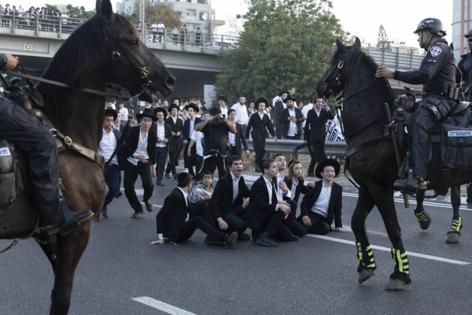Netanyahu's coalition shrinks after ultra-Orthodox party quits
Published in News & Features
An Israeli ultra-Orthodox party said it’s walking out of Prime Minister Benjamin Netanyahu’s coalition, threatening to leave the government with a razor-thin majority in parliament.
The United Torah Judaism party announced late on Monday it would quit in protest at a bill seeking to curtail the exemptions from military draft, long enjoyed by ultra-Orthodox Jews on religious grounds. Without the party’s seven lawmakers — whose departure comes into force on Wednesday — Netanyahu will wield just 61 of the 120 seats in parliament, making him vulnerable to no-confidence motions.
The loss of UTJ will also undermine Netanyahu’s ability to deliver on a truce with Iran-backed Hamas, forcing him to lean on far-right nationalists in the coalition who have balked at the Gaza ceasefire plan proposed by U.S. President Donald Trump.
A waiver from army service — otherwise mandatory for all able-bodied members of the country’s Jewish majority — has long been a sensitive subject in Israel, but especially so in light of the country’s more than 21-month-old war in Gaza. Tens of thousands of Israeli teenagers, mostly young men, have been called for service.
Netanyahu is likely to use the 48 hours before the walkout becomes effective to try to appease the party and bring it back into the coalition.
UTJ could still reverse course, Netanyahu spokesperson Topaz Luk said, playing down the likelihood the move might change the balance of power in Cabinet.
“I’m not worried,” Luk told Israel’s Army Radio. “The moment the right deal is on the table, the prime minister will be able to get it passed. I’m certain of that.”
Finance Minister Bezalel Smotrich and National Security Minister Itamar Ben Gvir have said they would oppose a Gaza truce they deem too lax.
The ceasefire plan would see fighting suspended for two months, during which half of the 50 hostages held by Hamas would be freed and end-of-war negotiations would be held. But officials on both sides say the mediated truce talks in Doha have made little progress due to disagreement over the scale of a proposed redeployment of Israeli troops within Gaza.
Even if an agreement for a pause can be reached, there’s no guarantee of lasting peace. Israel insists the war will not be called off before Hamas has been stripped of its power and weapons. The militant group — designated a terrorist organization by the U.S. and many other countries — refuses to disarm and wants more assurances that a truce would mean the end of the war. It has, however, indicated it would be willing to cede some power in Gaza.
The war was sparked when thousands of Hamas operatives crossed into Israel on Oct. 7, 2023, killing 1,200 people and abducting 250. More than 57,000 Palestinians have been killed since Israel began its offensive on Gaza, according to the Hamas-run health ministry, and vast stretches of the territory have been reduced to rubble. Israel has lost more than 400 troops in Gaza combat.
©2025 Bloomberg L.P. Visit bloomberg.com. Distributed by Tribune Content Agency, LLC.







Comments